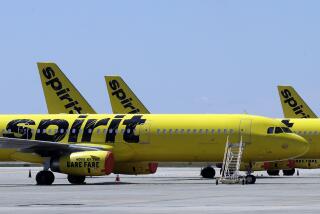Hughes Wins $114 Million in Patent Case : Technology: It is the largest such award ever against the U.S. government, but it falls far short of the companyâs expectations.
After a two-decade legal battle, a judge Friday awarded Hughes Aircraft $114 million for the aerospace firmâs patent claim that the U.S. government stole the technology that enabled the communications satellite revolution.
Although the award ranks as the largest ever levied against the federal government for patent infringement, it falls far below even the smallest sum that Hughes hoped to win in the high-stakes case. Both sides are expected to appeal.
When the trial began in 1988, Hughes had sought an award of $1.2 billion, and at one time company attorneys speculated about a potential award of $6 billion. But the firmâs high hopes were dashed Friday by a 26-page opinion from U.S. Court of Claims Judge James T. Turner.
âI am shocked that it is this low,â said Mark Meltzer, a former Hughes attorney who worked on the patent case. âThis is a lot lower than anybody expected. Taxpayers should be delighted.â
But Victor Savikas, an attorney representing Hughes, said the award âis a lot of money, though we asked for more.â
Justice Department lawyer Vito Di- Pietro, representing the government, said Turnerâs decision on the actual value of the patent âwas exactly what we had proposed and exactly what was supported by the evidence.â
The Hughes patent involved a device invented by Donald T. Williams, a brilliant young Harvard-educated engineer at Hughes in the 1960s who later committed suicide. Williams devised a simple, lightweight system to control the attitude of a satellite with a single rocket thruster.
In 1963, Hughes launched its Syncom, the first communications satellite. It paved the way for Hughes to dominate the world market, which it does even today. The effort was all the more impressive given that the Pentagonâs own attempt to build such a spacecraft resulted in a design so heavy that no rocket at the time could launch it.
As a result of the technical success of the Williams patent, Hughes had long expected to reap major rewards. Last fall, Turner ruled that the government had infringed the patent on 81 satellites over the years, worth a total of $3.5 billion.
The final step in the case involved determining the royalty rate and an interest penalty. In both areas, Hughes got less than it wanted.
Turner rejected the companyâs assertion that it deserved a royalty of 15% on the $3.5 billion worth of government satellites using the device. Instead, Turner awarded a 1% royalty rate, exactly what the Justice Department had proposed as fair.
Among the millions of documents involved in the case, a few key pieces of evidence appear to have seriously deflated Hughesâ claims.
In his ruling, Turner found that shortly after obtaining its patent, Hughes offered a direct competitor a license at a rate equivalent to about 1.2%. In a letter, Hughes cited that as its normal royalty for scientific and experimental satellites.
Moreover, Hughes was never able to license the invention to even a single company, excluding Ford Motor Co., which settled a separate infringement suit by Hughes.
But Savikas said the letter cited by Turner was involved in settlement negotiations for a civil suit and thus should not have been admitted as evidence--apparently raising a potential appeal issue. And he said the failure to obtain other licenses resulted in large part from the governmentâs infringement in the first place.
For Judge Turner, the ruling means he is free at last of the long-running dispute, and in honor of the occasion, he retreated to his chambers and broke open a bottle of champagne after handing down his decision.
How much of the award will be consumed by legal fees remains unclear. Meltzer said Hughesâ past legal expenses have amounted to âa significant percentage of this award.â But Savikas, Hughesâ current attorney, insisted that the companyâs legal fees are ânot anywhere near a substantial part of the award.â
More to Read
Inside the business of entertainment
The Wide Shot brings you news, analysis and insights on everything from streaming wars to production â and what it all means for the future.
You may occasionally receive promotional content from the Los Angeles Times.











